- Home
- Lissa Evans
V for Victory Page 13
V for Victory Read online
Page 13
‘So who’s your guardian now?’ asked Sim, his mouth full of cake.
‘My aunt.’ The reply was automatic, simply another layer of untruth on the existing pile.
‘And what’s her name?’
‘Mrs Margery Overs.’
‘And that house is hers now, is it?’
‘It’s mine,’ said Noel, impatient to get back to more central matters. ‘I don’t think I look very much like you.’
‘That may be so, but you’re awfully like my father at the same age.’
‘Am I? Have you a photograph?’
‘Not on me. Why don’t you come and sit down again? Who made the fruitcake?’
‘I don’t know.’
‘It’s welcome, of course, but it’s a touch solid. More anchor than life-buoy.’ He looked up and grinned as Noel sat down. ‘So tell me all about yourself. Where do you go to school? Who are your friends? What are your hobbies?’
‘Hobbies are for people who don’t read books,’ said Noel, answering the only straightforward question out of the three.
‘So not keen on sports?’
‘No.’
‘You’re clever, then?’
‘Yes.’
Sim laughed again. ‘Good, I’m delighted. I hope you apply yourself more than I ever did.’
‘What’s Cambridge like?’
‘I think you’d probably love it. Full of people who prefer books to hobbies.’
‘Were you in the navy before the war?’
‘No. Called up in ’40.’
‘So what’s your profession?’
‘I can’t say I’ve ever settled to any particular walk of life. I tried working in the old man’s office and couldn’t keep my eyes open, got the heave-ho after a month or two. Definitely not the favoured son. Taught a bit, travelled a bit, always had a taste for the sea. I was thinking I might get a yacht after the war – nothing fancy, a sloop of some kind. Drift up and down the Med – you could come and be my deckhand, you could swim in the Aegean and learn to tie knots. Can you swim?’
‘Yes, and I can tie knots as well.’
‘Well, there we go; the perfect companion. The water there’s like nothing you’ve ever seen – one moment it’s so clear you’d think the fishes were suspended in mid-air, and the next it’s an absolutely brilliant turquoise, like a kingfisher’s back, and the next moment you look round and it’s purple as far as the horizon.’
The teasing note had momentarily gone from his voice, the sense that every subject had to be mined for levity. For a second or two they stood together on a sun-warmed deck, hearing the soft slap of the waves.
‘Homer described it as “wine-dark”,’ said Noel, ‘ονοψ πóντος. Although, apparently, it’s possible that ονοψ should actually be translated as “maroon”.’
‘Should it?’ Sim cocked his head in thought. ‘Well, now I consider it, the colour’s definitely on the reddish side of purple. A drinkable Merlot, perhaps.’ He grinned again, and this time, Noel found himself smiling back.
‘Do you know,’ said his father, licking his fingers and then screwing the lid back on to the beetroot jar, ‘that was just about the best meal I’ve had since the invasion of Sicily. All we seem to eat at sea is tinned fish, which is apposite enough, I suppose, but – what is it? What’s the matter?’
‘I have to get back,’ said Noel, already on his feet and picking up the jar and the tea-towel and Vee’s string bag. ‘I forgot.’
‘Forgot what?’
‘When you said “tinned fish”. I left the rest of them playing Sardines. They were all in the lumber room, waiting for me to find them, but that was ages ago. My aunt will be worried about me. Or annoyed. Or both, most likely.’
‘Who do you mean by “all”?’
‘My aunt and the lodgers, and …’ He felt something brush his cheek, and looked up to see a sky sagging with cloud. ‘If I don’t go, she’ll come looking.’
‘Oh, your aunt takes in lodgers, does she? Profitable business?’
‘No, not really.’ They left the clearing and were suddenly in twilight. Sim stumbled over a root, and took out his torch, playing it over the path ahead, before twitching it suddenly upward. ‘What the hell?’
‘Barn owl,’ said Noel. ‘Can I see you again? When does your ship embark? Though I expect you’re not allowed to tell me that, are you?’
‘Not even if I knew myself. Perhaps I could drop round again if I’m still on leave next week?’
‘No. Let’s meet somewhere else. I don’t want …’ I don’t want this spoiled, he thought: the Aegean sunset, the yacht at anchor and Vee standing on the jetty, binoculars trained beadily on Sim.
They emerged from the woods into steady snow, the grass already disappearing. ‘How about the National Gallery?’ suggested Noel. ‘Or, no, better than that, how about the Victoria and Albert? It’s the only museum still open and, besides, there’s something I want to see there. I could meet you on Monday. In the Cast Court.’
‘I can try, but I shan’t know if I can get there till the day before. They’re always throwing duties at us, even in port. Tell you what, though, you couldn’t sub me something till we meet next, could you? A tenner would come in handy. Or a fiver?’
‘I think I’ve only got about three and six,’ said Noel. ‘But you can have that.’
‘Not really quite enough. I don’t suppose your aunt would spare a tenner for a sailor boy, would she?’
For a fraction of a second, Noel contemplated trying to sneakily access the golden-syrup tin in which Vee kept her cash.
‘I’m afraid not,’ he said. ‘Sorry.’
The roof of the Wimbournes’ house slid into view, between the trees.
‘Are you limping?’ asked his father.
‘I sometimes do when I hurry. What if I get to the V&A for nine o’clock every day next week, then? I can always sit and read. I’ll stay till midday in case you come later. Or would the afternoons be better?’ Noel could hear himself gabbling, seized with the sense that his own desperate yearning for another meeting wasn’t quite reciprocated – that if he didn’t hook a promise in the fifty yards between the Wimbournes’ house and his own, then his father might bob away again, out of reach.
‘Would the afternoons be better?’ he repeated, just as Vee’s voice became audible, calling his name.
‘Coming!’ he shouted. Through the trees, he glimpsed Vee, bareheaded, with her shawl round her shoulders, turning back towards the house.
‘Is that your aunt?’ asked Sim.
‘Yes.’
‘Well, I’m jolly glad there’s someone worrying about you – you’d better hurry home. And yes, I’ll try to get there, no fear, wouldn’t miss it for the world.’ He held out a bony hand, and Noel shook it.
‘Just in case,’ said Noel, ‘what’s your ship called? So I could write to you.’
‘Can’t say at the moment, I’m afraid – I’m about to be transferred. I can hear your aunt again. Off you go.’
Noel turned and picked his way through the ruts towards Green Shutters. When he arrived at the gate he looked round, but his father had gone.
‘I’m too fond of you not to tell you the truth,’ said Winnie, keeping her voice low, her expression warm, yet regretful. ‘We’ve known each other for nearly half our lives. You’re a decent man. There was a time when the only thing that I wanted was to marry you and to settle down and raise a family, but that’ – her voice shook a little – ‘that was before the tide of war swept us apart.’
‘Oh, give over!’ said her friend Elsie. ‘I can’t say that bit about the tide, Gordon’ll think I’ve gone nuts. But I liked what you said first, the bit about half our lives – hang on.’ She licked the end of her pencil and transcribed a few words on to the back cover of the Radio Times. ‘Go on, then,’ she said. ‘I need something about there not being anyone else.’
‘Why? Wouldn’t it be simpler just to pretend that you’ve met another chap and fallen in love?’
&
nbsp; ‘No, because I haven’t, and if Gordon asks me what this other chap’s called and where I met him, and what regiment he’s in and where he’s from, I’ll be stumped, won’t I? You know I can’t lie the way you do. Act, I mean,’ she corrected herself, over Winnie’s protest, and then grinned and turned her attention again to the Radio Times, her small, neat features sharpening with concentration. She was a petty officer in the WRNS and only a little younger than Winnie, but in her current pose – sitting cross-legged on a cushion, as close to the electric fire as possible, a blanket over her shoulders and Winnie’s beret pulled down over her ears – she looked about eleven, the same age as when they’d first met as fellow Amazons on a breezy hillside on Hampstead Heath. Winnie, who had been dressed in a Liberty double-breasted woollen coat with hartshorn toggles, could still remember the shock of noticing that Elsie, in February, was wearing a man’s jacket and no gloves, her fingers blebbed with chilblains. Poverty, before that moment, had been something that Winnie had read about in children’s stories – picturesquely smudged chimney sweeps and large-eyed matchgirls with a delicate pallor and long golden hair. She hadn’t realized that cheap food could make you spotty or a freezing flat could give you ugly hands; she hadn’t realized, either, that poor people weren’t necessarily ashamed of their poverty. If Elsie mentioned that she’d never tasted a tomato or been to the theatre or owned a brand-new item of clothing, she stated it merely as a fact; it was Winnie who’d found the admissions embarrassing, pointing up as they did the velvety ease of her own life. One week, she’d brought a tomato for Elsie to try, expecting wonderment, and Elsie had coughed out the half-chewed piece into her palm and thrown it into a bush. ‘Horrible,’ she’d said, cheerfully enough. The gloves had gone down better – a pair lined with rabbit-fur, which Winnie hadn’t ever worn because they reminded her of Benjamin Bunny – but their actual friendship had sprung not from patronage, but from an overheard remark.
‘What’s that girl called?’ Elsie had whispered to Ida Pearse, one of the older members.
‘Which girl?’
‘The one who always knows everyfing about everyfing.’
‘Oh, that’s Avril Bridge. She’s Winnie’s twin.’
‘Twins? They’re twins? What, both of them?’
‘Yes.’
‘But that girl Avril, she’s …’
Winnie had braced herself for the inevitable comparison: … ten times prettier than Winnie … so much brainier than Winnie … not nearly as fat as Winnie.
‘… she’s a right bossy old show-off, isn’t she? And Winnie’s ever so nice.’
A marvellous warmth had flooded through Winnie, leaving a tidemark of indelible gratitude; it had never occurred to her during her constant skirmishes with Avril – the mutual insults and sly pinches that punctuated their days – that she was actually nicer than her twin. The week after that, during a game of stalking, Elsie had compared Avril’s looks unfavourably with those of a ferret and the bond was sealed. The club had foundered, but the two girls had continued to meet – there’d been a pedagogic element at first, with Winnie going to the library to ‘help the poor girl’ (as she explained to her parents) with her arithmetic and spelling; Elsie, though, was a quick study, which meant there was always plenty of time left over for whispered discussions about film stars or where babies came from (Elsie was one of nine) or the perennially enjoyable topic of how awful Avril was. Aside from the delicious interest of these conversations, the effect on Winnie’s own academic performance was considerable, since she had to work hard to stay ahead of her pupil, but the most wonderful thing of all was that Elsie admired her. It was a balm that soothed the dents inflicted by Avril.
‘All right,’ said Elsie, looking up from the Radio Times. ‘What should I say next?’
‘Hang on, let me have a think – I mean, you’ve rather sprung this on me.’ Not that she hadn’t been thinking for years that Elsie had got herself a brick when she deserved a diamond. Gordon lived next door and had wooed her by the simple expedient of cementing himself to her side. ‘When did you make up your mind?’
‘On the train on the way up from Portsmouth, so about’ – Elsie checked her watch – ‘four hours ago. It happened all of a sudden, it was like – what’s that thing called? – the road to Zanzibar?’
‘What, with Bob Hope?’
‘No, the one with the saint, in the Bible, he falls off his horse.’
‘Road to Damascus.’
‘Yes. It was like this’ – she clicked her fingers. ‘We were just crossing the Downs and they were all white and perfect, like icing sugar, and I was thinking about how Gordon wants to set a date for the wedding, and instead of feeling excited I felt dead flat, I just couldn’t pick myself up, it was as if I was looking all round but couldn’t see anything that … that shone, and then I heard this noise – I didn’t have a seat, I was wedged in next to the heads, and there were four of my ratings in the same carriage, all in uniform, and one of them was flirting with a marine, and she was laughing so loudly that she sounded drunk, and everyone was staring and I stood up on tiptoe and caught her eye and gave her a look – just one of my officer looks, I didn’t say anything – and she shut up, straight away, and I thought, I’m good at this, I am. And then I thought, Why don’t I chuck it in with Gordon? and it was like … flash-bang!’ She looked up with wonder, as if following the trajectory of a shooting star. ‘… I’d got it. I’d found the answer. I’d always thought – you know, end of the war, back to the Post Office, back to Gordon – he’s a foreman at Cossor’s now, did I tell you? – and I’d thought … that’ll be all right. It’ll be all right. And you know Gordon, Winnie. You know that he’s …’
There was a pause.
‘… All right,’ supplied Winnie.
‘Yes.’
Their eyes met for a fraction of a second and Elsie made a spluttering noise that was close to a sob, and then recovered herself. ‘And I thought, I don’t want to go backwards. And I know it’s going to be horrible, telling him, but I know this is right, I know it, I know it. And I’m going to stay in the Wrens – that was the other bit of the “flash-bang”. They’re already talking about transferring girls to the Fleet Air Arm after the war, and they always need telegraphists and I could end up just about anywhere. Australia. Damascus.’
‘Zanzibar!’
The whistle on the kettle began its rising shriek, and Winnie turned off the gas and refilled her hot-water bottle, wedging it between her belt and her jumper. She’d have to get ready for Avril’s party soon; her pale-blue crêpe dress and a new pair of stockings were hanging over a chair.
‘You could say something like: “We’ve been apart too long, Gordon. We’ve both changed.”’
‘But he hasn’t changed.’
‘“We’ve been apart too long, Gordon, and I’ve changed.”’
‘All right, I can try that.’ Elsie transcribed the words. ‘Do you think I have, though?’
‘No,’ said Winnie. ‘Not a bit. You’ve always been dynamite.’
Elsie reached out and gave one of Winnie’s hands a squeeze. ‘You’re a pal,’ she said.
They had nearly reached the Tube station, picking their way across the filthy sandwich of ice and mud that covered the pavements, when Winnie spotted the van, its back door half open, the pale smear of a streetlight picking out the gilded words ‘BREAD AND CAKES’ on the side. She crossed the road and peered in; the interior was empty.
‘What’s the matter?’ called Elsie.
‘I’m not sure.’ The row of terraced houses beside it was derelict, the roofs missing, rafters crossed like bean-sticks, but in one of the windowless front rooms she could see a torch dipping and probing, and the silhouette of a policeman’s helmet.
‘Wait here a mo,’ she said to Elsie.
‘Why?’
‘That’s the mortuary van.’
‘It can’t be.’
‘The official one got buzz-bombed. I just want to check what’s going on.’
<
br /> She knocked at the open front door.
‘Who’s there?’
‘Is that Constable Orr?’ she called. ‘It’s Warden Crowther. From Post 9. I was just passing.’
She edged from the narrow hall into what had been the front parlour. The room stank of woodsmoke and it was crowded, striped with shadows from the constable’s torch. An empty stretcher was propped upright against a wall, two Light Rescue men standing beside it with arms folded while Dr Skipton crouched next to something on the damp floor.
‘What’s happened?’ she asked. The torch swung round towards her.
‘Win? You look smart. Didn’t know you had legs.’
‘Back here, please,’ said the doctor.
Winnie took out her own torch and edged the beam towards what lay on the ground, mentally bracing herself. If you had to look at a corpse, then an official relationship made all the difference – squeamishness took second place if you had a job to do, even if that job was simply to find a blanket or to note down a name or date. Here she was only a spectator. Her torch-beam slid across trousered legs and a bucket from which a set of old fire irons protruded.
‘It’s Jim,’ she said. She could see the old man’s stained tartan shawl now, and the Afghan hat. He was lying on his back with his arms crossed, like a Crusader on a tomb, his face all hollows and sharpness, the skin no longer mottled, but the dull white of putty.
‘Froze to death, poor soul,’ said Dr Skipton, straightening up. ‘So far as I can tell, though, it’s quite likely he had TB as well – I gather he had a permanent cough. Thank you, you can take him now,’ he added, to the stretcher-bearers.
‘How did you find him?’ asked Winnie.
‘Someone reported seeing a fire in here last night,’ said the constable. ‘I think he must have tried to light another, but snow kept coming down the chimney. Don’t suppose you know if he had any next of kin?’
‘I don’t even know if his name was really Jim.’ She shifted out of the way as the stretcher came past, one of the bearers stumbling over the bucket, the doctor following. ‘He told me once he’d been gassed in the Great War and he’d had a bad chest ever since.’

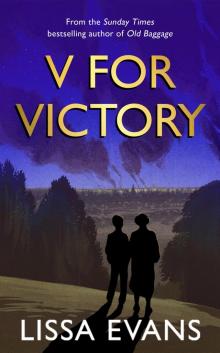 V for Victory
V for Victory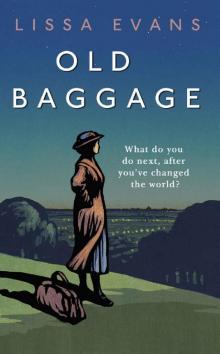 Old Baggage
Old Baggage Wed Wabbit
Wed Wabbit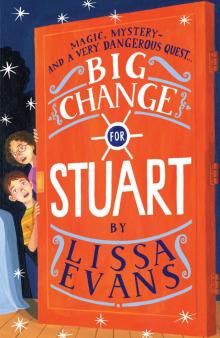 Big Change for Stuart
Big Change for Stuart Spencer's List
Spencer's List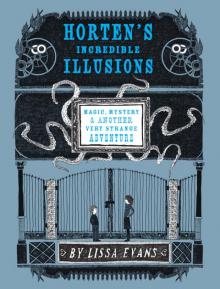 Horten's Incredible Illusions
Horten's Incredible Illusions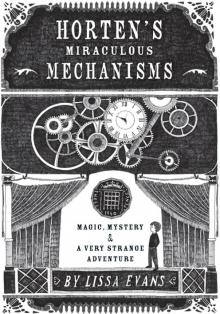 Horten's Miraculous Mechanisms
Horten's Miraculous Mechanisms Their Finest Hour and a Half
Their Finest Hour and a Half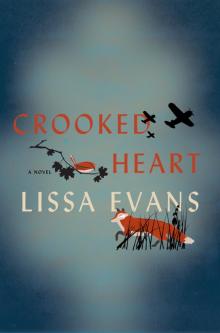 Crooked Heart
Crooked Heart